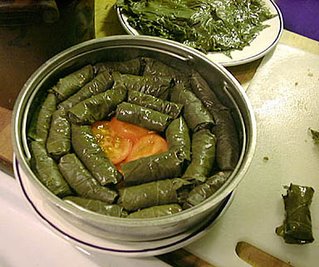1. One stick of butter (4 OZ).
2. Four small or three medium onions.
3. One cup of water.
4. One can tomato paste (12 OZ).
5. One Cabbage.
6. Four more cups of water.
7. One small spoons of Salt and 1/4 spoon of Pepper.
8. Four cups Rice.
9. Chopped Parsley.
10. Four bouillion cubes.
Procedure
1. Wash the four cups of rice several times, and keep it in water for about ½ an hour. Then, wash rice, drain water out.
2. Cut the cabbage core. Carfully separate the cabbage leaves.
3. Boil water, then place about 10 leaves in the boiling water for about 5 minutes. Remove leaves and drain the leaves. Then, add more leaves to the boiling water and repeat until you are done cooking all leaves.
4. Cook one stick of butter with onions, until the onion becomes brown. Then, add one cup of water and tomato paste to the onion. Cover them and cook together on low for about 10 minutes. Stir every 2 minutes.
5. Add tomato paste and onion mixture to rice. Add one small spoon of Salt and 1/4 spoon of Pepper to the rice. Add chopped parsley to the rice, and mix well.
6. Soup Mixture: Boil 4 cups of water and add four Beef or Chicken bouillion cubes to the water. Boil for 2 minutes.
7. The most difficult part: Cut big cooked cabbage leaves in half. Place a small amount of rice mixture in leaf and roll.
8. Put foil in the bottom of a sauce pan. Place all rolled cabbage in the pan.
9. Cover the rolled cabbage with the soup mixture.
10. Cook for about 50 minutes on medium heat. Check until the water disappears. Keep checking every 5 minutes until it is cooked
The left over cabbage and rice can be mixed together and cooked as a casserole.

Comments